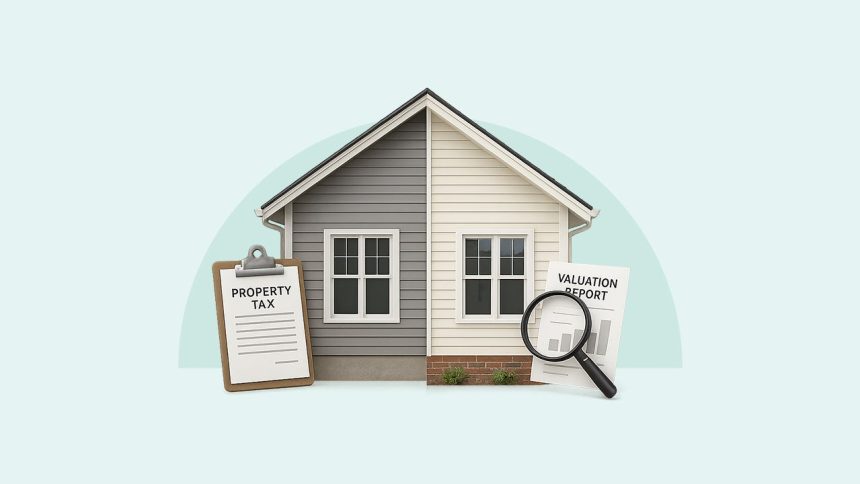Image & Illustration by Bankrate
Key takeaways
- Assessed value is determined by the local government and is most often used to determine how much you pay in property taxes.
- Appraised value is done by an independent appraiser and is most often used during the mortgage approval process.
- Typically, appraised values are higher than assessed values because they factor in current market conditions.
One of the trickiest parts of dealing with real estate is figuring how much a property is worth. When you’re talking about the value of a home, you might encounter the terms “assessed value” and “appraised value.” Though they sound similar, they have essential differences that are crucial to understand, whether you’re selling a home or buying one.
Put simply, assessed value is the amount your local government thinks your home is worth; it’s what is used to determine property taxes. Appraised value, though, is the amount a professional home appraiser thinks your home is worth; it’s typically used by lenders when considering a mortgage application. Typically, appraised values are higher than assessed values.
What is a home’s assessed value?
The assessed value of a home is the amount that the local government believes the home is worth. Think of it in terms of a tax assessment: Typically, the local assessor’s office assigns a value to a property based on factors such as the size and location of the lot, the size and amenities of the home and recent sale prices of similar homes in the area.
Your city or town will charge property taxes based on that assessed value. For example, if your city assesses your home at $550,000 and charges a 2.5 percent property tax, you’ll owe $13,750 in property taxes each year.
Some areas allow for certain exemptions, such as not charging tax on the first $100,000 in assessed value or exempting a portion of the value for owner-occupied homes. If you believe that the government has assessed your home unfairly and is overcharging you, you can appeal your property assessment. Doing so typically involves having an assessor visit your home to re-evaluate it.
What is a home’s appraised value?
A home appraisal is a professional examination by a qualified professional (usually licensed, though that may vary by state) to determine the value of a property. Appraisers also look at things like recently sold homes in the area, a home’s size and number of bedrooms and bathrooms, lot size and, crucially, the home’s condition and apparent level of upkeep.
Most often, an appraisal is performed during the mortgage application or refinancing process. An independent appraiser is hired by the lender to confirm the home’s value before they agree to give you a mortgage.
If a home is appraised for less than the loan amount you want to borrow it can be a problem. This is called an appraisal gap. For example, if you want to get a $300,000 loan to buy a home but it only appraises for $275,000, that’s a problem for the lender. You’ll either need to negotiate a lower purchase price with the seller or pay the $25,000 difference out of pocket.
Assessed value vs. appraised value: Key differences
Both assessed and appraised value determine how much a home is worth, but they use different methods and serve different purposes.
| Assessed value | Appraised value | |
|---|---|---|
| Purpose | To determine a property’s value for tax purposes | To determine a property’s value and make sure it matches the requested loan amount |
| Who determines the value? | Local assessor (part of your local government) | Independent appraiser (typically hired by a mortgage lender or interested buyer) |
| When is the value determined? | Periodically, varies by state (for example, Maryland assesses property values every 3 years) | Whenever the appraiser assesses a property, most often when a buyer is looking to take out a new mortgage |
| How often does it change? | When the local government assesses it — anywhere from once a year to once every few years | Whenever an appraiser is hired to determine the home’s value |
| Factors that are considered | Size and location of the lot, size and amenities of the home, recent sale prices of similar homes in the area | Recently sold homes in the area, number of bedrooms and bathrooms, lot size, condition and upkeep of the home, recent sale prices of similar homes in the area |
| Impact | Changes how much you’ll pay in property taxes | Can create issues with your mortgage application and purchase offer if the value comes in lower than your requested loan amount |
Other ways of determining home value
There are many ways to determine the value of a home, each with pros and cons. Some other examples include:
- Real estate comps: This valuation method involves looking at similar properties in a particular area and seeing what they recently sold for. If a two-bedroom, 1,000-square-foot home in your neighborhood recently sold for $300,000, it stands to reason that another two-bedroom, 1,000-square-foot home a block or two away would likely sell for around the same amount. (Depending on each home’s condition, of course.)
- Comparative market analyses: Like comps, this type of analysis relies on looking at recent sales of homes in your area. It’s typically put together by a local real estate agent who knows the area well and goes into deep detail, including factors like price per square foot, condition and more.
- Automated valuation models (AVMs): An AVM is a computer algorithm that uses existing data to determine the value of a property. Zillow’s Zestimate is one of the best known examples. These are a convenient starting point for determining value, but they are not the most accurate method — there are many different AVMs out there, and you may find that each will produce a different value for the same property.
Why does home value matter?
While the exact value of your home can be debatable, knowing your home value and whether it’s going up or down can help you plan for your future. For instance, you can plan for an increase or decrease in property taxes when you know approximately how much your home is worth. If you plan to sell your home in the near future, an estimated home value can also help you figure out a fair asking price.
Home value is also important when you’re shopping for a home. Even if you aren’t financing your purchase with a mortgage, you may choose to get an appraisal to make sure you’re not overpaying for the property.
You may be able to use home value to pay less on your mortgage or cash out your equity as well. If you own a home and the value goes up, your equity increases. Refinancing at a higher home value than when you bought it means you may be able to eliminate mortgage insurance, or you may have extra equity that will allow you to take some cash out.
Learn more: How much money do you keep from a home sale?
Why we ask for feedback
Your feedback helps us improve our content and services. It takes less than a minute to
complete.
Your responses are anonymous and will only be used for improving our website.
Help us improve our content
Read the full article here
















